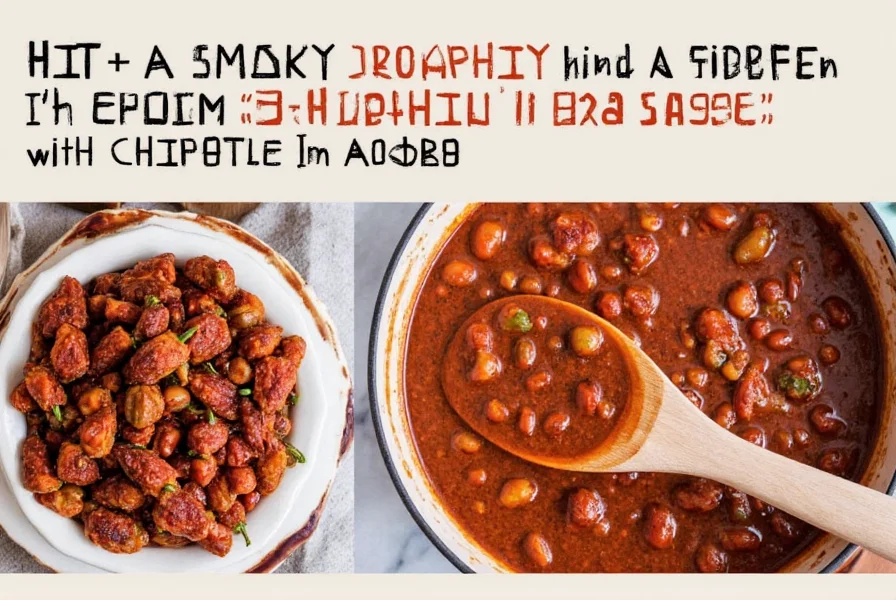Smoky Heat: A Spicy Journey Through Global Chili Traditions with Chipotle in Adobo Sauce
Table of Contents
Introduction to Chipotle in Adobo Sauce
If you've ever tasted a smoky, slightly sweet, and intensely spicy flavor, you've likely encountered chipotle in adobo sauce. This Mexican staple is more than just a seasoning—it's a cultural icon that has found its way into kitchens around the world. From tacos to stews, chipotle in adobo sauce adds depth, heat, and a rich, tangy flavor that can elevate any dish.
The chipotle chili itself is a dried, smoked jalapeño pepper. When it’s rehydrated and blended with a tangy tomato-based adobo sauce, it becomes a versatile ingredient that can be used in both traditional and modern cooking. It's no wonder that this fiery paste has become a favorite among spice enthusiasts and professional chefs alike.
Global Spice Traditions and the Role of Chipotle
Spices are more than just flavor enhancers—they’re a window into the history, culture, and identity of different regions. From the bold curries of India to the fragrant blends of the Middle East, each cuisine has its own unique relationship with spices. Chipotle in adobo sauce may originate from Mexico, but it has carved out a place in global culinary traditions.
Let’s explore how chipotle in adobo sauce fits into the broader world of spices and how it compares to other popular chilis:
| Chili Type | Origin | Flavor Profile | Common Uses |
|---|---|---|---|
| Chipotle in Adobo Sauce | Mexico | Smoky, sweet, tangy, spicy | Tacos, salsas, marinades, stews |
| Guajillo | Mexico | Earthy, fruity, mild heat | Adobo sauces, moles, soups |
| Poblano | Mexico | Earthiness, mild heat | Chiles rellenos, salsas |
| Ghost Pepper | India | Extremely hot, citrusy | Curries, hot sauces |
| Sriracha | Thailand | Garlicky, tangy, mildly spicy | Sauces, condiments, noodles |
As you can see, chipotle in adobo sauce stands out for its unique combination of smokiness and acidity. While other chilis bring their own distinct flavors, chipotle offers a depth that can transform a simple dish into something unforgettable.
Practical Tips for Cooking with Chipotle in Adobo Sauce
Whether you're an amateur enthusiast or a seasoned chef, here are some practical tips to help you make the most of chipotle in adobo sauce:
- Start Small: Chipotle is potent—use a teaspoon at first and adjust as needed.
- Blend It In: For a smooth texture, blend the sauce into your dish using a blender or food processor.
- Use It as a Marinade: The adobo sauce works great on meats like chicken, pork, or even tofu.
- Add Depth to Sauces: Mix it into barbecue sauce, aioli, or even creamy dressings for extra flavor.
- Make Your Own: If you're feeling adventurous, try making your own chipotle in adobo sauce by smoking jalapeños and blending them with tomatoes, vinegar, and spices.
One of the most exciting things about chipotle in adobo sauce is its versatility. You can use it to add smokiness to a grilled burger, stir-fry, or even a dessert like chocolate mole. Its balance of heat and sweetness makes it a crowd-pleaser across cultures and cuisines.
Buying Guide: Choosing the Best Chipotle in Adobo Sauce
With so many brands and varieties available, choosing the right chipotle in adobo sauce can be overwhelming. Here’s what to look for when purchasing:
- Quality Ingredients: Look for products that list real peppers, tomatoes, and natural seasonings. Avoid those with excessive preservatives or artificial additives.
- Texture: The best chipotle in adobo sauce should have a thick, chunky consistency with visible bits of chili. A smooth sauce might be less authentic.
- Flavor Balance: A good adobo sauce should have a nice balance of smokiness, tanginess, and heat. Some brands lean too heavily on salt or vinegar, which can overpower the flavor.
- Brand Reputation: Popular brands like La Costeña, San Marcos, and Herdez are known for quality chipotle in adobo sauce. These are great starting points for beginners.
- Shelf Life: Once opened, chipotle in adobo sauce can last up to a year if stored properly. Unopened, it can last several years in the pantry.
When shopping for chipotle in adobo sauce, consider the following features and use cases:
| Product | Features | Advantages | Target Audience | Suitable Occasions |
|---|---|---|---|---|
| La Costeña Chipotle in Adobo | Chunky, smoky, tangy | Great for recipes requiring texture | Cooking enthusiasts, home cooks | Grilled meats, tacos, stews |
| San Marcos Chipotle in Adobo | Smooth, balanced, versatile | Perfect for sauces and dips | Professional chefs, casual cooks | Marinades, dressings, hot sauces |
| Herdez Chipotle in Adobo | Rich, full-bodied, aromatic | Excellent for enhancing flavor | Spice lovers, international cuisine fans | Mexican dishes, fusion recipes |
Chipotle in adobo sauce is not just a condiment—it's a flavor enhancer that brings warmth, complexity, and authenticity to your meals. Whether you're preparing a traditional Mexican meal or experimenting with new recipes, this ingredient is sure to impress.
Conclusion
Chipotle in adobo sauce is more than just a spicy ingredient—it's a symbol of tradition, taste, and global influence. From its roots in Mexico to its presence in kitchens worldwide, this smoky, tangy paste continues to captivate spice lovers and culinary professionals alike. With the right techniques and a little creativity, you can unlock the full potential of chipotle in adobo sauce and take your cooking to the next level.
So, whether you're a beginner looking to experiment or a pro seeking to refine your skills, don’t underestimate the power of chipotle in adobo sauce. It’s a small jar with a big impact—and it’s definitely worth adding to your spice rack.











 浙公网安备
33010002000092号
浙公网安备
33010002000092号 浙B2-20120091-4
浙B2-20120091-4